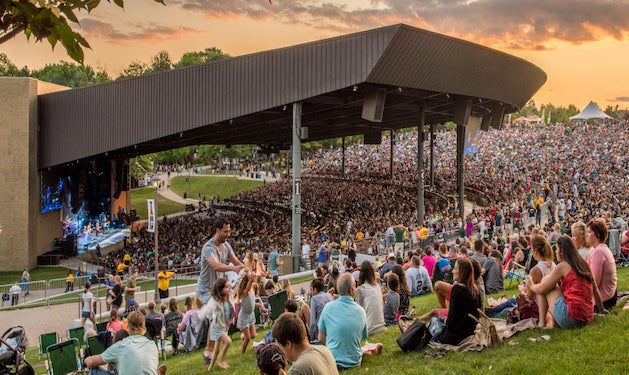The Incredible String Band: 50 Years of Peace & Music
Scottish psychedelic folk group The Incredible String Band was riding a wave of popular and critical success in 1969. They were scheduled to perform on Friday evening with the other folk acts, but they refused to play in the rain and were rescheduled to play Saturday evening between Keef Hartley Band and Canned Heat. The audience, ready for a night of hard rock, did not exactly warm up to the more traditional, folk sound of The Incredible String Band.
Day Two, Performer 6: The Incredible String Band
Performed Saturday evening, August 16, 6:00–6:40 pm

The Incredible String Band performing at the Woodstock festival. Left to right: Rose Simpson, Mike Heron, Christina "Licorice" McKechnie, and Robin Williamson. Photographer unknown.
The Incredible String Band Members
- Mike Heron: multi-instruments
- Robin Williamson: vocals, multi-instruments
- Christina "Licorice" McKechnie: organ, vocals
- Rose Simpson: bass, vocals, multi-instruments
The Incredible String Band Woodstock Setlist
- Invocation
- The Letter
- Gather ’Round
- This Moment
- Come with Me
- When You Find Out Who You Are
Pioneering British psychedelic folk group The Incredible String Band (ISB) was founded in Edinburgh, Scotland in 1965 by multi-instrumentalists and songwriters Robin Williamson and Mike Heron, with banjoist Clive Palmer. The group became a duo with Palmer’s departure in 1966. ISB’s first two albums, The Incredible String Band (1966) and The 5000 Spirits or the Layers of the Onion (1967), were noted for their varied instrumentation and experimentation, and the band started to gain a large following. Paul McCartney even named 5000 Spirits “my favorite album of 1967.”

and their followup, The 5000 Spirits or the Layers of the Onion (1967).
By 1968, ISB included the Williamson’s and Heron’s respective girlfriends and collaborators, Christina “Licorice” McKechnie and Rose Simpson. Their next two albums, The Hangman’s Beautiful Daughter and the double album Wee Tam and the Big Huge, both released in 1968, received accolades from their musical peers and fans. ISB toured the United States and the United Kingdom behind these albums, expanding their fan base and critical respect.

in the U.K. and the U.S. in 1968 and would have
been the most recent offerings from The Incredible String Band
before they played Woodstock.
The albums were also released together
as a double LP in the U.K. in 1968 and in the U.S. in 1994.
Despite their recent success however, the band’s Woodstock appearance did very little to enhance their reputation. They performed no music from any of their albums, and their placement on the schedule on a day otherwise set aside for hard rock acts didn’t work in their favor. Heron’s and Williamson’s performances were to their usual standard, but the vocal harmonies of McKechnie and Simpson were weaker than expected. On record, the group’s psychedelic brand of pastoral British folk music was transcendent, multi-layered and mysterious. In a live performance setting, those layers of exotic instrumentation were necessarily stripped away to a basic combination of (mostly) acoustic instruments.
Williamson kicked off the Woodstock proceedings by reciting a poem, “Invocation,” (later issued on the album U). While the audience fell to a respectful hush, this was not a captivating start to a performance in front of the biggest crowd the band could ever hope to play to. It was followed with a rendition of Mike Heron’s breezy “The Letter” (to be issued on the 1970 album I Looked Up), the acoustic instrumentation dissolving over the Woodstock throng. Robin Williamson’s bouncy “Gather Round” enlivened the set, and the mood was cemented with Heron’s moving “This Moment” (also from I Looked Up), which featured prominent backing vocals from Licorice and Rose. It was back to Williamson for “Come With Me” (later released on Be Glad For the Song Has No Ending). Lilting vocals and instrumentation temporarily gave Yasgur’s Farm the feel of a Renaissance Fair. Another Williamson composition closed out the set. The lengthy “When You Find Out Who You Are” won over the crowd with its positive message. While not necessarily their finest moment, The Incredible String Band’s performance at Woodstock was at the very least relaxed and enjoyable.
The following year, ISB was not included in the Woodstock movie or soundtrack album. So, despite a pleasant if not bombastic showing, many of their fans and potential fans were unaware that the band had even been at Woodstock.
After Woodstock, ISB experienced frequent personnel changes. By 1972, both Rose Simpson and Licorice McKechnie had both left the group, being replaced by various others. In 1974 the group totally broke up and Williamson and Heron both went on to pursue solo careers. Robin Williamson has released over 40 albums of Celtic- and jazz-influenced music, earning a Grammy nomination in 1995. Mike Heron continued to record and tour regularly with various other musicians around the United Kingdom and the United States. Though she never returned to music professionally, Rose Simpson served as Lady Mayoress of the Welsh town of Aberystwyth in 1994 before earning a PhD in German Literature in 2017. In 2020, she released a book about her time with ISB; Muse, Odalisque, Handmaiden: A Girl’s Life in The Incredible String Band. Licorice McKechnie disappeared from public life after various performances in the 1970s and her recent whereabouts, and in fact, whether she is still living remains the subject of speculation.
Heron and Williamson reunited as The Incredible String Band in 1997. They toured as a trio with founding member Clive Palmer until breaking up again in 2003. Both continue to pursue solo careers.
—Wade Lawrence & Scott Parker; Edited by Julia Fell July 2021.
